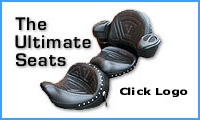|
Gary
|
 |
« on: February 07, 2012, 10:59:39 AM » |
|
Was looking for some better options than my old needle craftsman ft/lb in/lb wrench.
It's somewhat bulky and not clean/accurate for the lower torque values (i.e. header bolts, etc). Thought it might be time to check into it.
TIA.
|
|
|
|
|
 Logged
Logged
|
|
|
|
|
da prez
|
 |
« Reply #1 on: February 07, 2012, 02:07:14 PM » |
|
I have several. If not a lot of use, craftsman. Use it a lot, Mac tools sells a good one as well as Snap-on (pricey) When I was working, I sent them in for calibration every other year on a rotation basis. There are some aftermarket that are so-so. Utica Bonney is a very good brand as well as Indestro. Had another brand but the name slips my mind.
da prez
|
|
|
|
|
 Logged
Logged
|
|
|
|
Valker
Member
    
Posts: 3049
Wahoo!!!!
Texas Panhandle
|
 |
« Reply #2 on: February 07, 2012, 02:32:29 PM » |
|
I know I'll catch flak for this, but I bought a 1/4" drive in/lbs torque wrench from Harbor Freight for $15. I only use it on the exhaust bolts and carefully remove tension after each use so as to not mess up their mechanism. I know it's a cheap wrench, but for my occasional use it works perfectly.
|
|
|
|
|
 Logged
Logged
|
I ride a motorcycle because nothing transports me as quickly from where I am to who I am.
|
|
|
|
da prez
|
 |
« Reply #3 on: February 07, 2012, 08:56:32 PM » |
|
I will try to explain this in a short verson. If you torque a nut to 100 pounds, and use another torque wrench to check it, it is a wasted motion. It takes about 10%increase to move it. In theory, 110 pounds will not move it, but 111 should. I was in several tech schools and this subject cane up several times until it was put to the test in the classroom. If you want to do a comparrison, use a calibrated (or known good )torque wrench with adapter . set good wrench at 10 pounds (or where ever) and the other a pound higher. the good one should click and the other should not. reverse the settings and try again. This should get you in the ballpark.
da prez
|
|
|
|
|
 Logged
Logged
|
|
|
|
|
Gary
|
 |
« Reply #4 on: February 08, 2012, 06:53:32 AM » |
|
Thanks all for the feedback. I won't have any real heavy or active use, just occasional and wanted to improve from the historical best guesstimate method. Much appreciated.  |
|
|
|
|
 Logged
Logged
|
|
|
|
|
Ricky-D
|
 |
« Reply #5 on: February 08, 2012, 08:35:07 AM » |
|
I think more bolts have been broken using a torque wrench improperly than by simple brute force.
The best insurance to protect the integrity of a fastener is to avoid using too big a tool on a fastener.
You can't get a large torque figure using a small short wrench,,,,,,,, well, let me correct that,,
There are some mechanically minded afficionados that are capable of attaining huge torque values from even the smallest wrenches. Like for instance using two hands on a four inch wrench.
***
|
|
|
|
|
 Logged
Logged
|
2000_Valkyrie_Interstate
|
|
|
|
RP#62
|
 |
« Reply #6 on: February 08, 2012, 09:01:47 AM » |
|
From my limited knowledge of torque wrenches, a beam-type will remain in calibration pretty much for the life of the tool. The down-side to them is that you have to be able to see the scale when you're torquing. That's not always easy. On the break-away type, you just listen for the click, so they are easier in that regard, but their calibration wanders over time so they must be periodically recalibrated. On the ones we use at work, they're recalibrated either every 6 months or annually.
If you want to check one against another, don't try them on the same bolt, because as da prez noted, you'll just be checking starting torque not running torque, instead, use one to torque the other. A 3/8th drive 7/16 12-point socket will accomodate a 3/8 square drive on either end. Set one wrench to mid-range and then torque it with the other wrench and see how close the two values are.
As far as ranges, torque wrenches are typically the most accurate at mid scale, so if you have the option, get one whose mid scale reading approximates the value you will be using most often.
These are generalities not absolutes - there are always exceptions.
-RP
|
|
|
|
|
 Logged
Logged
|
|
|
|
|
Brian
|
 |
« Reply #7 on: February 08, 2012, 06:52:59 PM » |
|
I have and use both types depending on the what I am working on. I back off the breakaway ones to relieve that internal spring pressure when not in use. I don't know if this is needed or recommended. My beam unit will not read the range needed for some of our required bolt tightness.
|
|
|
|
|
 Logged
Logged
|
|
|
|
|
Madmike
|
 |
« Reply #8 on: February 08, 2012, 09:01:23 PM » |
|
these people make a good product.. they make wrenches for Snap-On and Mac http://www.torqwrench.com/ |
|
|
|
« Last Edit: February 11, 2012, 06:42:51 PM by Madmike »
|
 Logged
Logged
|
|
|
|
|
PharmBoy
|
 |
« Reply #9 on: February 09, 2012, 10:01:51 AM » |
|
I found a 1/4" Matco on Ebay for a reasonable price. My 3/8" & 1/2" Snap-On were found in pawn shops. All were in like new condition with the red boxes and well worth what they cost. It sure doesn't hurt to offer less than the asking price in a pawn shop...Jim
|
|
|
|
|
 Logged
Logged
|
A politician is a fellow who will lay down your life for his country. ~Texas Guinan
4th Infantry Tet Vet
99 Interstate
97 Bumble Bee
97 Red & White
|
|
|
|
The Anvil
|
 |
« Reply #10 on: February 09, 2012, 02:35:36 PM » |
|
Torque wrenches are one of the few areas where I think Snap-On is worth the money. Proto also makes an excellent torque wrench. In my business those two are pretty much all we use. But for home use you can get along fine with Craftsman. I'd be real wary of using HF torque wrenches.
|
|
|
|
|
 Logged
Logged
|
Boxer rebellion, the Holy Child. They all pay their rent.
But none together can testify to the rhythm of a road well bent.
Saddles and zip codes, passports and gates, the Jones' keep.
In August the water is trickling, in April it's furious deep.
1997 Valk Standard, Red and White.
|
|
|
|
RickMXZ
|
 |
« Reply #11 on: February 10, 2012, 08:19:56 AM » |
|
RP#62 is correct in my opinion. I spent 10 years calibrating all types of torque wrenches for a jet engine assembly area. Break away, dial, beam, micrometer, many brands. For calibration as long as the beam is pointing at zero at rest the readings should be accurate to 5% thru out the range. For what size wrench target torque should be 50 to 75% of the wrenches full range. With micrometer wrenches that make the engine oil drain plug very easy make sure to back the handle off to unload the spring (which could take a set and reduce the actual torque).
|
|
|
|
|
 Logged
Logged
|
|
|
|
|






